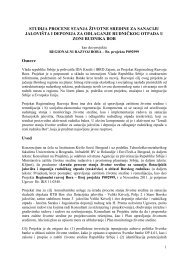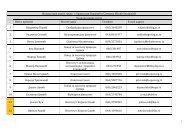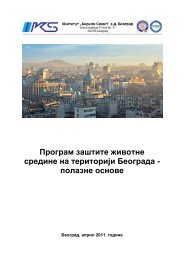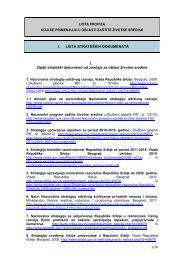transport of dangerous goods and risk management - Kirilo SaviÄ
transport of dangerous goods and risk management - Kirilo SaviÄ
transport of dangerous goods and risk management - Kirilo SaviÄ
You also want an ePaper? Increase the reach of your titles
YUMPU automatically turns print PDFs into web optimized ePapers that Google loves.
TRANSPORT OF DANGEROUS GOODS AND RISK MANAGEMENT 223Table Legende:*) Regulations <strong>of</strong> Article 51 <strong>of</strong> «ZOPOM» expire on May 23, 2009, concerning the <strong>transport</strong> approval <strong>of</strong> poisonsover state border (import, export, transit). See Article 106, Chemical Law (Official Gazette <strong>of</strong> RS, No36/2009) which is published on May 15, 2009 <strong>and</strong> comes to effects on May 23, 2009.**)Confirmed interpretation from the Ministry <strong>of</strong> Infrastructure is that the mentioned is valid just for the<strong>transport</strong> <strong>of</strong> poisons in the internal <strong>transport</strong>.We can see from the Table 1. if for the <strong>transport</strong> <strong>of</strong> specific class <strong>of</strong> <strong>dangerous</strong> <strong>goods</strong> (kind <strong>of</strong> <strong>dangerous</strong>), it isnecessary to have the «APPROVAL» from specific competent ministry, <strong>and</strong> on the basis <strong>of</strong> which regulation(«ZOPOM» or «Government Regulation»). In practice «APPROVALS» for the <strong>transport</strong> are called «DECISIONS»on <strong>transport</strong> or «LYCENCES» for <strong>transport</strong>.APPLYING OF „SAFETY“ PRINCIPLETraffic developing under these conditions is moving slowly, <strong>and</strong> according to words <strong>of</strong> the experts from the EUAdministration - unacceptably. By main applying <strong>of</strong> one <strong>of</strong> main <strong>transport</strong> principles – “SAFETY” principle, asolution, which reduces potential <strong>risk</strong>s during realization <strong>of</strong> <strong>dangerous</strong> <strong>goods</strong> <strong>transport</strong>, occurs. Where dilemmasoccur, after defining all possible options, variant with the smallest <strong>risk</strong>, namely, the safest variant is always beingchosen. Possible assistance for finding solutions <strong>of</strong> bigger dilemmas is certainly in the Competent Ministries.Interactive relation between economy <strong>and</strong> legislation is pulsing result <strong>of</strong> economic needs <strong>and</strong> answers on thementioned.This way <strong>of</strong> functioning is definitely under compulsion <strong>and</strong> it must be regarded as transitional category. Finalsolution should very soon become active, by coming into force new «Dangerous Goods Transport Law», by whichall the four above mentioned regulation will not be valid („ZOPOM“, „Government Regulation“, „Rulebook 120“<strong>and</strong> «Guideline171»). This act creates a lot <strong>of</strong> space for making rules <strong>and</strong> guidelines, which will prescribe <strong>and</strong> ordermore precise <strong>and</strong> more real, in accordance with EU regulation <strong>and</strong> National regulation the Republic <strong>of</strong> Serbia, theprocedures <strong>and</strong> obligations <strong>of</strong> participants (players) in the <strong>dangerous</strong> <strong>goods</strong> <strong>transport</strong>.RULEBOOK FOR INTERNATIONAL DANGEROUS GOODS TRANSPORT – „RULEBOOK (RID)“Guiding principle <strong>and</strong> reference for harmonization <strong>of</strong> rules is Annex „С“ <strong>of</strong> International Rail Transport Convention„(COTIF)“– Rulebook for International rail <strong>transport</strong> <strong>of</strong> <strong>dangerous</strong> <strong>goods</strong> (with annex as its constituent part), knownunder the abbreviation „(RID)“(valid <strong>of</strong> 01/ 01/ 2009), (Hereinafter „Rulebook (RID) “).«Rulebook (RID)» is valid, basically, for International Dangerous Goods Rail Transport on the territories <strong>of</strong>Member States «(COTIF)» <strong>and</strong> for the <strong>transport</strong> which is supplement for rail <strong>transport</strong>, where „Uniform Rules(CIM)“ are applied, which are subject to valid International rules for the <strong>transport</strong> in other modes <strong>of</strong> <strong>transport</strong>. The<strong>transport</strong> to which this «Rulebook (RID)» applies, is subject to, among other things, General National regulation orInternational regulation on <strong>dangerous</strong> <strong>goods</strong> rail <strong>transport</strong>.Member States «(COTIF)» are (status as <strong>of</strong> June 30, 2008.): Albania, Algeria, Belgium, Bosnia <strong>and</strong> Herzegovina,Bulgaria, Denmark, Germany, Estonia, Finl<strong>and</strong>, France, Greece, Iran, Iraq, Irel<strong>and</strong>, Italy, Croatia, Letonia,Liechtenstein, Lithuania, Lebanon, Luxemburg, Morocco, Hungary, Former Yugoslav Republic <strong>of</strong> Macedonia,Monaco, Netherl<strong>and</strong>s, Norway, Austria, Pol<strong>and</strong>, Portugalia, Romania, Sweden, Switzerl<strong>and</strong>, Serbia, Slovakia,Slovenia, Spain, Syria, Czech Republic, Tunis, Turkey, Ukraine, United Kingdom. Each Member State reserves theright to regulate or prohibit the International <strong>dangerous</strong> <strong>goods</strong> <strong>transport</strong> on its territory from the safety reasons on itsterritory.








